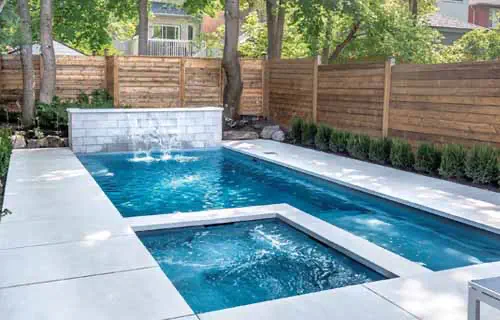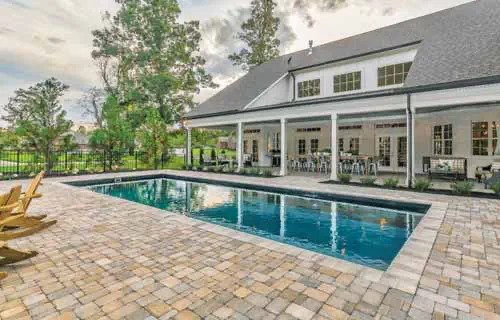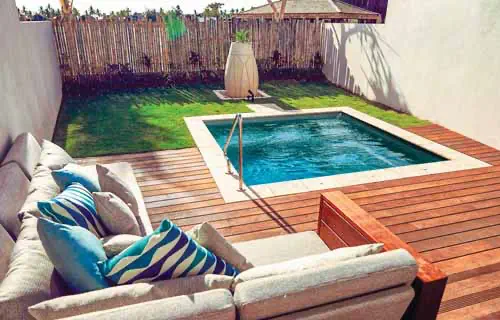The size of your swimming pool is more than just a matter of aesthetics; it's a crucial aspect that affects functionality, maintenance, and overall enjoyment. Whether you're planning to host lively pool parties or create a tranquil oasis for relaxation, the right pool size can make all the difference.
In This Article:
Understanding the Importance of Pool Size
- Why Pool Size Matters: The size of your pool determines how you and your family can use it. A small pool might be perfect for a quick dip or lounging, but it may not be suitable for swimming laps or entertaining large groups. Conversely, an oversized pool might look impressive but can become a burden in terms of maintenance and costs.
- Balancing Aesthetics and Functionality: Your pool should complement the overall design of your property. A pool that's too large can overwhelm your yard, while a too-small pool might look out of place. Finding the right balance ensures that your pool enhances your property's appearance while still meeting your family's needs.
- The Impact on Budget and Maintenance: Larger pools generally cost more to install and maintain. They require more materials, more energy to heat, and more chemicals to keep clean. Understanding these factors upfront can help you choose a size that fits your budget without sacrificing enjoyment.
Finding the Right Swimming Pool Size
Choosing the right swimming pool size for you and your family is a decision that requires careful consideration. It's not just about picking a size that looks good; it's about understanding your family's needs, your property's limitations, and your budget. In this comprehensive guide, we'll explore all these factors, helping you make an informed decision that leads to years of enjoyment and satisfaction.
Section 1: Assessing Your Needs and Preferences
Understanding Your Family's Swimming Habits
When it comes to finding the right swimming pool size, understanding how you and your family plan to use the pool is paramount.
- Recreational vs. Professional Use: Will your pool be a place for leisurely swims and family fun, or do you have serious swimmers in the family who need space for laps? Knowing the primary purpose of your pool will guide you in selecting the right size.
- Children's Needs and Safety Considerations: If you have young children, safety must be a top priority. A pool with a shallow end or a separate wading area might be ideal. Consider adding safety features like fencing or alarms as well.
- Pool Parties and Social Gatherings: If you love entertaining, a larger pool with ample deck space might be the way to go. Think about how many guests you typically host and plan accordingly.
Evaluating Your Property's Size and Shape
Your property's dimensions and landscape play a significant role in determining the right pool size.
- Measuring Available Space: You'll need to accurately measure the available space, considering not just the pool itself but also the surrounding area for lounging, dining, and landscaping.
- Considering Landscape and Terrain: The slope, soil type, and existing vegetation can all impact the pool's size and shape. Consulting with a professional can help you understand what's feasible.
- Local Zoning Laws and Regulations: Don't forget to check local zoning laws and obtain necessary permits. Regulations may limit how close the pool can be to property lines, buildings, or septic systems.
Budget Considerations
A pool is a significant investment, and understanding your budget upfront can save headaches down the road.
- Initial Installation Costs: These will vary based on the pool's size, shape, and features. Get multiple quotes to understand what's reasonable for your area.
- Ongoing Maintenance and Energy Costs: Larger pools will generally cost more to maintain. Consider energy-efficient equipment to help offset these costs.
- Potential Return on Investment: While a pool can enhance your property's value, it's unlikely to pay for itself if you sell. Choose a size and style that's consistent with other homes in your neighborhood to maximize potential returns.
Section 2: Exploring Different Pool Sizes and Shapes

Medium-Sized Pool: Leisure Pools Limitless

Large Pool: Leisure Pools Infinity
Small Pools: Benefits and Drawbacks
Small pools, often referred to as plunge pools or cocktail pools, are becoming increasingly popular, especially in urban areas with limited space.
- Ideal for Small Families or Limited Space: If you have a small yard or simply want a pool for cooling off and relaxing, a small pool might be perfect.
- Cost-Effective and Easy to Maintain: Smaller pools typically cost less to install and maintain, making them an attractive option for many homeowners.
- Potential Limitations on Activities: While charming and cozy, small pools may not be suitable for swimming laps or hosting large gatherings.
Medium-Sized Pools: A Versatile Option
Medium-sized pools offer a great balance between functionality and cost.
- Suitable for Most Families: With enough space for swimming, playing, and relaxing, a medium-sized pool can meet the needs of most families.
- Balance Between Cost and Functionality: While more expensive than small pools, medium-sized pools offer more versatility without a dramatic increase in maintenance costs.
- Variety of Shapes and Designs: From classic rectangular designs to freeform shapes, medium-sized pools offer plenty of design options.
Large Pools: Making a Statement
For those looking to make a splash, large pools offer endless possibilities.
- Perfect for Large Families or Avid Swimmers: If you have a big family or want space for serious swimming, a large pool can accommodate your needs.
- Increased Costs and Maintenance: While impressive, large pools come with higher installation and ongoing maintenance costs.
- Potential for Unique Features and Customization: Large pools offer space for features like diving boards, waterfalls, or even a swim-up bar.
Section 3: Design Considerations for the Right Pool Size
Choosing the Right Shape
The shape of your pool can greatly influence its appearance and functionality.
- Rectangular, Oval, Kidney-Shaped, and More: Different shapes offer various aesthetic and practical benefits. Rectangular pools are great for laps, while freeform shapes can blend with natural landscaping.
- Matching the Pool Shape to Your Property: Consider the architecture of your home and the layout of your yard. The pool shape should complement, not clash with, its surroundings.
- Aesthetic Considerations: Think about the overall look you want to achieve. Whether modern and sleek or natural and organic, the shape plays a significant role in achieving your vision.
Depth Considerations
The depth of your pool is not just about diving or swimming; it's about safety and comfort.
- Shallow vs. Deep Ends: A shallow end is great for kids and lounging, while a deep end allows for diving and more serious swimming.
- Safety Considerations for Children: If children will be using the pool, consider safety ledges and gradual depth changes.
- Impact on Swimming and Other Activities: Depth can affect the pool's usability for different activities, from water games to exercise.
Additional Features and Amenities
Your pool can be more than just a place to swim. Consider these additions:
- Waterfalls, Slides, and Diving Boards: These features add fun and visual interest but require careful planning and additional space.
- Hot Tubs and Spas: A connected hot tub can provide year-round enjoyment.
- Lighting and Landscaping: Thoughtful lighting and landscaping can turn your pool area into a nighttime oasis.
Section 4: Working with Professionals
Finding a Reputable Pool Builder
Choosing the right builder is crucial for a successful project.
- Researching Local Builders: Look for builders with experience, proper licensing, and positive reviews.
- Checking References and Reviews: Speak with past clients and read online reviews to gauge satisfaction.
- Understanding Contracts and Warranties: Know what's included in the contract and what warranties are offered.
Collaborating with a Designer
A designer can help turn your vision into reality.
- Customizing Your Pool's Appearance: From materials to layout, a designer can guide you through the choices.
- Incorporating Your Personal Style: Share your preferences and lifestyle needs to create a pool that's uniquely yours.
- Ensuring Functionality and Safety: A designer can balance aesthetics with practical considerations like safety and maintenance.
Understanding the Construction Process
Knowing what to expect can make the construction process less stressful.
- Timeline and Stages of Construction: Understand the expected timeline and the various stages, from excavation to finishing touches.
- Potential Challenges and How to Overcome Them: Weather, unexpected site conditions, or changes to the plan can cause delays. Communication with your builder is key.
- Inspections and Final Approvals: Be aware of required inspections and what's needed for final approval.
Section 5: Maintenance and Care for Your Pool Size
Regular Cleaning and Maintenance
Proper maintenance is essential for the longevity and enjoyment of your pool.
- Frequency and Methods: Regular cleaning, including skimming, vacuuming, and balancing chemicals, is essential. The size of your pool will influence the time and resources needed.
- Hiring a Professional Service vs. DIY: Depending on your pool's size and complexity, you may choose to hire a professional service or handle maintenance yourself.
- Seasonal Considerations: Different seasons may require different care, such as winterizing your pool or preparing it for summer use.
Long-Term Care and Renovations
Your pool will require ongoing care and occasional updates.
- Resurfacing and Repairs: Over time, the pool's surface may need resurfacing or repairs. Regular inspections can help you catch issues early.
- Upgrading Features and Equipment: As technology advances, you may choose to upgrade to more energy-efficient equipment or add new features.
- Planning for Future Needs: Consider how your family's needs may change over time and plan for potential future renovations.
Conclusion
Finding the right swimming pool size for you and your family involves careful consideration of many factors. From understanding your family's needs and budget to exploring different sizes, shapes, and features, this exploration has provided a roadmap to guide your decision.
With this knowledge in hand, you're well-equipped to consult with professionals, start the planning process, and take the exciting step toward enjoying your perfect backyard oasis. The joy and benefits of pool ownership await you!
FAQs
- What is the average size of a family swimming pool?
- The average pool size varies based on needs and property size, but typical family pools range from 18 to 36 feet in length.
- How do I determine the right pool size for my property?
- Consider your family's needs, property dimensions, budget, and local regulations. Consulting with a professional can provide personalized guidance.
- Can I change the size or shape of my pool later on?
- Significant changes may be costly and complex. It's best to choose the right size and shape from the start.
- What are the ongoing costs associated with different pool sizes?
- Larger pools generally cost more to maintain due to increased energy and chemical needs. Consider these factors when choosing a size.
- How do I find a reputable pool builder in my area?
- Research local builders, check references and reviews, and ensure proper licensing and experience.
- What safety considerations should I keep in mind for children and pets?
- Consider features like fencing, alarms, shallow areas, and safety ledges to protect children and pets.

